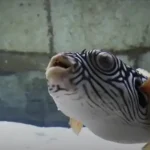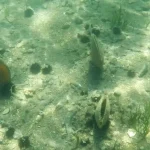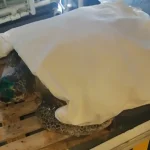As Glas Istre/Borka Petrovic writes on the 1st of January, 2020, once upon a time, in the middle of winter, turtles would arrive at Pula aquarium’s turtle recovery centre cold and sick, and today in the winter, turtles with injuries to their limbs caused by their entanglement in nets, plastic waste and various types of marine waste arrive throughout the winter.
All this speaks volumes about the fact that there is more and more garbage being dumped in the Adriatic sea, notes Aleksandra Bel Dajković, the manager of Pula aquarium.
Just a few days ago, a very small and thin turtle in a seriously bad condition arrived at Pula aquarium and is currently being housed in the Sea Turtle Recovery Centre. The turtle was named Free Wings, after the boat on which the crew found the animal caught up in a net in which a rope, various pieces of plastic and a branch got tangled.
As has since been learned from the manager of Pula aquarium, Aleksandra Bel Dajković, because of all that waste she has been dragging behind her body for who knows how long, her right right fin was necrotic and she was completely exhausted. Fortunately, as soon as she received an infusion, she was immediately energised and Pula aquarium’s staff are confident that she will recover very quickly at their recovery centre.
The turtle has already begun to eat on her own, she especially loves sardines and squid, and the wound on her fin has been cleaned with antiseptic every day, with special honey being added to it for recovery, Bel Dajković who cares for with two other loggerhead turtles along with Free Wings. The two other turtles are Marvin and Ryan, who are both young. Four such young individuals who had been recovering at Pula aquarium have already been successfully returned back to sea following recovery.
Marvin was found caught in a net with a large open neck wound, while Ryan was found tangled up in waste. Due to a significant injury to his fin, he was recently amputated in Zagreb, but he is also now recovering well.
The Sea Turtle Recovery Centre, as Bel Dajković explained, was officially formed back in 2006 and co-financed by Pula aquarium, but turtles were being admitted for recovery even before that date. In all, more than 160 turtles have passed through it so far, and most of them have successfully recovered and been returned back to sea.
”It’s interesting how the situation has changed over the years. Once upon a time, large individuals came to us, and now there are more and more young ones. On the other hand, in the middle of winter, the turtles that arrived were cold and unwell, and today in winter, turtles arrive with injuries to their limbs caused by their entanglement in nets, plastic, and various types of marine waste,” she said.
Otherwise, sea turtles are among the most endangered animal species and are therefore protected by numerous national and international regulations. They have been strictly protected in Croatia since 1995. Despite their protection, sea turtle populations are declining dramatically throughout the world, and so are the Croatian turtles. It has therefore proved necessary to establish sea turtle recovery centres worldwide.
The Pula Sea Turtle Recovery Centre operates within Pula aquarium and cares for injured sea turtles from across the Croatian Adriatic. On arrival at the centre, each turtle undergoes a thorough examination to determine its health, assess the severity of any injuries, or identify any disease. The turtles located in the centre are housed in pools with flowing seawater maintained at a temperature suitable for their recovery (25 °C).
The daily care for the sea turtles located in the centre consists of regular feeding, the cleaning of their pools and thorough health checks. The turtles are fed on a daily basis, usually with sardines. Their recovery takes place under the supervision of a veterinarian who prescribes the treatment required. After recovery, and before being released back into the sea, the turtle is tagged. The tag contains the turtle’s number, which allows the individual to be identified if found again and to compare their condition (weight, health) with previous data.
In addition to treatment and care, the activities of the centre are related to the education of the general public on turtles. One form of education is the public release of recovered sea turtles, which takes place every June on World Sea Turtle Day, and sometimes twice a year. This event has already grown into a traditional and very popular event with an increasing number of citizens and tourists participating every year.
Make sure to follow our dedicated lifestyle page for more.










